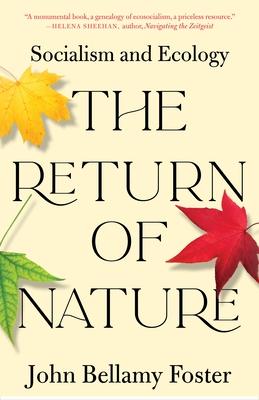Winner, 2020 Isaac and Tamara Deutscher Memorial Prize
A fascinating reinterpretation of the radical and socialist origins of ecology Twenty years ago, John Bellamy Foster's Marx's Ecology: Materialism and Nature introduced a new understanding of Karl Marx's revolutionary ecological materialism. More than simply a study of Marx, it commenced an intellectual and social history, encompassing thinkers from Epicurus to Darwin, who developed materialist and ecological ideas. Now, with The Return of Nature: Socialism and Ecology, Foster continues this narrative. In so doing, he uncovers a long history of the efforts to unite questions of social justice and environmental sustainability, and helps us comprehend and counter today's unprecedented planetary emergencies. The Return of Nature begins with the deaths of Darwin (1882) and Marx (1883) and moves on until the rise of the ecological age in the 1960s and 1970s. Foster explores how socialist analysts and materialist scientists of various stamps, first in Britain, then the United States, from William Morris and Frederick Engels, to Joseph Needham, Rachel Carson, and Stephen J. Gould, sought to develop a dialectical naturalism, rooted in a critique of capitalism. In the process, he delivers a far-reaching and fascinating reinterpretation of the radical and socialist origins of ecology. Ultimately, what this book asks for is nothing short of revolution: a long, ecological revolution, aimed at making peace with the planet while meeting collective human needs.
Winner, 2020 Isaac and Tamara Deutscher Memorial Prize
A fascinating reinterpretation of the radical and socialist origins of ecology Twenty years ago, John Bellamy Foster's Marx's Ecology: Materialism and Nature introduced a new understanding of Karl Marx's revolutionary ecological materialism. More than simply a study of Marx, it commenced an intellectual and social history, encompassing thinkers from Epicurus to Darwin, who developed materialist and ecological ideas. Now, with The Return of Nature: Socialism and Ecology, Foster continues this narrative. In so doing, he uncovers a long history of the efforts to unite questions of social justice and environmental sustainability, and helps us comprehend and counter today's unprecedented planetary emergencies. The Return of Nature begins with the deaths of Darwin (1882) and Marx (1883) and moves on until the rise of the ecological age in the 1960s and 1970s. Foster explores how socialist analysts and materialist scientists of various stamps, first in Britain, then the United States, from William Morris and Frederick Engels, to Joseph Needham, Rachel Carson, and Stephen J. Gould, sought to develop a dialectical naturalism, rooted in a critique of capitalism. In the process, he delivers a far-reaching and fascinating reinterpretation of the radical and socialist origins of ecology. Ultimately, what this book asks for is nothing short of revolution: a long, ecological revolution, aimed at making peace with the planet while meeting collective human needs.Paperback
$29.56